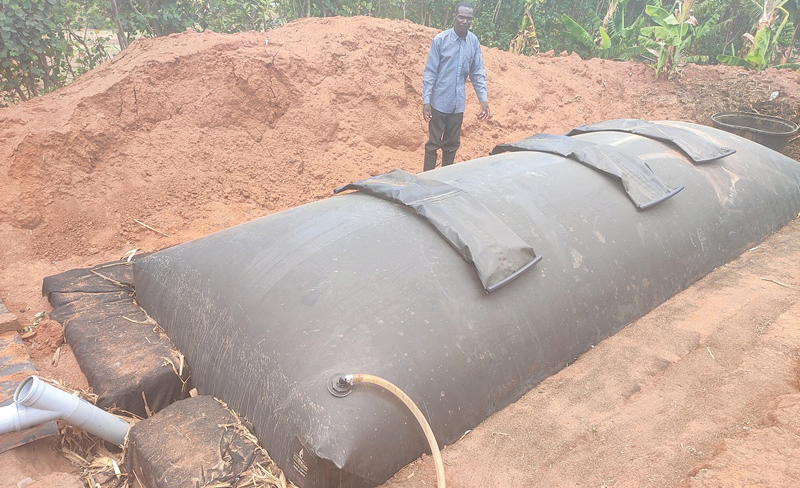Biogas digester changes Eneless’s life
Life is no longer the same for Eneless Chimenya, 45, from Chinkwende Village, Traditional Authority (T/A) Bvumbwe in Thyolo District.
For her, the day started at 3.30am when she woke up to look for firewood. She had to cover a long distance and, as such, she ensured that she woke up on time. She would pass by people selling charcoal, but ignored them.

“As you can see, we travel long distances because we no longer have many trees in our area. We pass by people carrying charcoal, but they do not sell us because they say we ask for huge discounts,” says Eneless.
In most cases, she had to rush back home to prepare breakfast for her school-going children and sometimes her husband, Jeffrey, who is a lead farmer.
“I sometimes felt guilty when my children reported late for school because of delays in preparing food for them. Luckily, they understood the situation and they never complained,” she says.
But things changed for the Chimenya family in March this year when they received visitors from Dwale Extension Planning Area (EPA). They informed the family that they had been chosen to be provided with a biogas digester and cooker after an assessment of farmer field school members where Jeffrey is one of the 30 members.

Eneless was surprised. She knew about the gas cooker, but that was something for the town, not the village. She could not afford it.
However, the officials told her that with technical support from the Food and Agriculture Organisation of the United Nations (FAO) through the European Union, funded Kulima and Afikepo projects, selected farmer field school livestock farmers would get biogas digesters and cookers.
Later, materials for the biogas digester were brought and the biogas was installed.
Here is how to cook using a biogas digester. Animal dung is put in a feeding tank where water is also poured.
The dung then passes through the inlet reactor piping into the main reactor where fermentation takes place.
Gas is then produced which goes through a pipe connected to the gas cooker.
The reactor releases manure through the outlet reactor piping into the biofertiliser tank.
Eneless is happy with the biogas digester cooker.
She says: “Things have changed for me because I no longer go out early in the morning to look for firewood.
“My children go to school on time. Even when my husband wants to bathe hot water, it does not take much time to prepare. It’s not laborious, he also does some of the cooking.”
Eneless is not the only one who speaks well of the biogas digester. Jane Banda Kuchombe from group village head Kuchombe, T/A Mpunga in Chiradzulu, tells a similar story.
She goes further by explaining how biofertiliser is helping her harvest ore crops.
She says: “With the high cost of fertiliser, manure from biogas digester has become a big deal.
“It is like killing two birds with a stone because we use the biogas for cooking as well as collect liquid fertiliser for our gardens.”
Kuchombe showed reporters two gardens; one where she applied liquid fertiliser collected from the biogas digester and the other where she did not. The difference was there for all to see. The garden where liquid fertiliser was applied showed health maize plants.
On cooking, Kuchombe says it is becoming easier which helps her meet the family’s schedules.
She narrates: “Here in the village we have to do several tasks in a day. Children have to go to school. We have to tend to our livestock, get feed for them, and we also have to take care of our gardens.
“The biogas cooker helps to quickly prepare food and hot water for bathing. It is far much quicker to do those things with a biogas cooker than charcoal or firewood.
“With this modern way of cooking, we are better off than some of the people in town who use charcoal for cooking.”
Jessy Chakondwa from Gunde Village also from T/A Bvumbwe in Thyolo, who also has a biogas digester cooker, is particularly concerned with the environment.
She says using biogas digester has reduced the cutting down of trees for firewood.
Says Chakondwa: “It is no secret that the cutting down of trees due to firewood or charcoal has worsened the environment, resulting in delayed rains.
“Every day, the trees are cut for firewood and charcoal, but I am happy to report that my family is no longer part of the people that cut trees for cooking. The practice is indeed terrible due to lack of firewood alternatives, but reducing it by one family makes a difference.”
Thyolo agriculture extension development officer Brenda Kabaghe says their main task is to ensure that those farmers that acquired biogas digesters are taking care of them so that they last long.
She also says that farmers are told to report any fault so that they are referred to relevant authorities for action.
Chiradzulu assistant veterinary officer Joseph Kalaveti says he is impressed that many farmers that received biogas generators are able to follow instructions.
“People are now able to understand the importance of manure, that they can be used to produce energy which is normally cheap,” he says.
Kulima project has been promoting sustainable agricultural growth and incomes to enhance food and nutrition security in Malawi within the context of a changing climate, while Afikepo project has been promoting nutrition sensitive agriculture.
The projects, which end in 2023, have been implemented in 10 districts, namely Chitipa, Karonga, Mzimba, Nkhata Bay, Nkhotakota, Kasungu, Salima, Chiradzulu, Thyolo and Mulanje.






One Comment